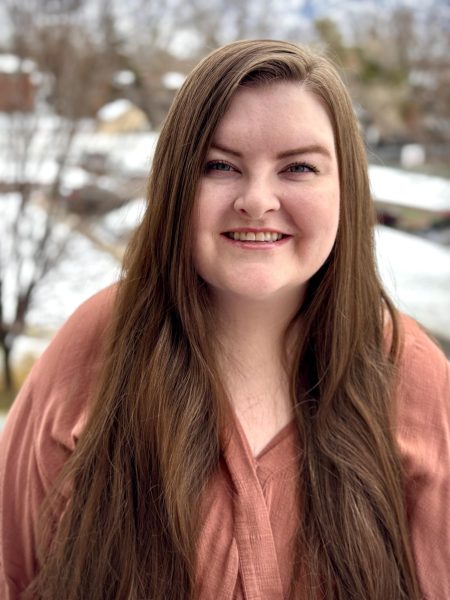On Monday afternoon, approximately 300 attendees gathered at Kingsbury Hall to honor the legacy of Dr. Martin Luther King Jr. at the 41st annual MLK Day March and Rally. One of many planned activities at the University of Utah campus for MLK week, the event’s speakers highlighted this year’s theme of “Learning to Action, Movement Towards Just Communities.”
The day’s events began with an opening prayer from Rev. France Davis. He spoke gratefully to God for 41 years of the U “celebrating, acknowledging and representing human rights.”
“Help us to learn, but also to apply what we learn,” he said.
Marching Towards Justice Daily
The first speech was delivered by Dr. Sidni Shorter, president and CEO of the Utah Black Chamber of Commerce and director of the Utah Minority Business Development Agency. She asked the crowd, “Do we truly share Dr. Martin Luther King’s dream, or do we merely celebrate it?”
“Dr. King’s dream was never meant to be confined to speeches or symbolic gestures. It was, and still is, a call to action; a rally cry to march towards justice, equality and love, daily,” Shorter said. “Are we moving towards a just world with the urgency it demands? Or do we stand still, just spectate or complain, all while comforted by our progress while inequalities persist all around us?”
Shorter emphasized the importance of “marching daily,” because the first step is what creates momentum for change. This could mean mentoring young people, supporting Black-owned businesses and voting in elections, including local elections.
She ended her speech with a call and response from the crowd. To calls like, “With a moral compass that sets our course” and “Until there is a collective transformation,” the crowd shouted back, “March.”
A King With a Dream
Nevaeh Parker, president of the Black Student Union and assistant director of the Culture and Belonging Board, delivered an original poem, titled “A King with a Dream.” Parker, a sophomore at the U with a major in political science and a minor in African American studies, has a background in participating in rallies, public speaking and debate.
The Daily Utah Chronicle spoke to Parker after the event and asked her what brought her to the rally.
“I love being in a community. Other human beings and my connections to the people I love are what keep me here and I really think that is what this day is about,” Parker said. “Being around people you can trust. People who are safe. People who are allies. I think this is a beautiful thing today especially with the inauguration. We are going to need a lot of love and coming togetherness in the next four years, and I think this is a great way to start it.”
Interconnection of Community and Culture
Utah State Rep. Sandra Hollins (D-Salt Lake) spoke of the importance of community. She referenced Dr. King’s “Letter from a Birmingham Jail,” quoting, “We are tied together in the single garment of destiny, caught in an inescapable network of mutuality, and whatever affects one directly affects all indirectly.”
Hollins spoke on the importance of building communities in which we live, we want to live and we want our children to live. This begins with understanding that community is not built simply by living near one another, but by sharing culture.
“Culture isn’t just about tradition, music and language; it’s about how we choose to treat one another and how we choose to live with one another despite our differences,” Hollins said. “Dr. King knew that for true justice and equality to prevail, it wasn’t enough to simply pass laws or make speeches. We need a cultural revolution.”
Still Here and Still Fighting
Speaker Rachel Weaver, commissioner of the Martin Luther King Jr. Human Rights Commission and founder of the Black Menaces, began her speech by highlighting not only Dr. King but also “the wonderful Black women who were standing shoulder to shoulder with him to make sure that we were able to be here today.”
Weaver stated her goal as the final speaker of the day was to get the crowd energized for the upcoming march. She referenced a social media post from the NAACP that said, “This day belongs to MLK.”
She then began a call and response of her own with the crowd.
“Even after the state legislator dismantled DEI programs across the state, we are still here,” Weaver shouted.
“And still fighting,” the crowd returned.
“Even as today marks the inauguration of a president who has threatened and continues to threaten the rights of all of us, we are still here,” she continued.
“And still fighting,” attendees shouted.
“Even as our nation becomes more divided and the threat of hate, prejudice and racism is as real as ever, we are still here.”
“And still fighting.”
Weaver wanted to highlight that despite other events happening, today was about the legacy of Dr. King. She wished to honor that legacy by sharing her favorite quote from his final speech, titled “I’ve Been to the Mountaintop.”
“Let us rise up tonight with a greater readiness. Let us stand with a greater determination. And let us move on in these powerful days, these days of challenge to make America what it ought to be,” Weaver quoted. “We have an opportunity to make America a better nation.”
She ended her speech with a call to action for the crowd.
“How will you keep fighting to make the community we reside in better?” Weaver asked. “How will you ensure Dr. King’s dreams and vision for a better America will happen?”
The Time Is Always Right To Do Right
The rally ended with surprise speaker Martell Teasley, associate provost for Strategic Academic Initiatives at the U. Teasley’s speech pointed out how low Dr. King’s favorability rating was at the time of his death, both from mainstream voices and those within the African American community.
Teasley stated this was due to Dr. King’s stance, as a drum major for peace, against the Vietnam War. Despite his colleagues urging against him taking this public position, Dr. King said, “The time is always right to do right.”
Teasley also discussed Dr. King’s demonstration of the value of work, perseverance and lifelong commitment. He said Dr. King embodied these traits in all that he did.
“He taught us to value love, instead of hate,” Teasley said. “There is no love without kindness and humility.”
The rally concluded with two surprise guests, LeiLoni McLaughlin, director of the U’s Center for Community and Cultural Engagement and Francis Battle, principal of Salt Lake City’s Nibley Park School. They took the stage to present the MLK Legacy Award to Emma Houston, assistant vice president for Community Engagement at the U.
Houston had just come from receiving the Rosa Parks Award at the NAACP award luncheon earlier that day, and joked about being overdressed for a march.
Sam Carey, lead events coordinator at the Center for Community and Cultural Engagement, said this is the first year that her team has been in charge of this event. Previously, before H.B. 261 shut down several resource centers and offices at the U, the event was organized by the Equity, Diversity and Inclusion Office.
“We are healing from [what] has happened,” Carey said.



